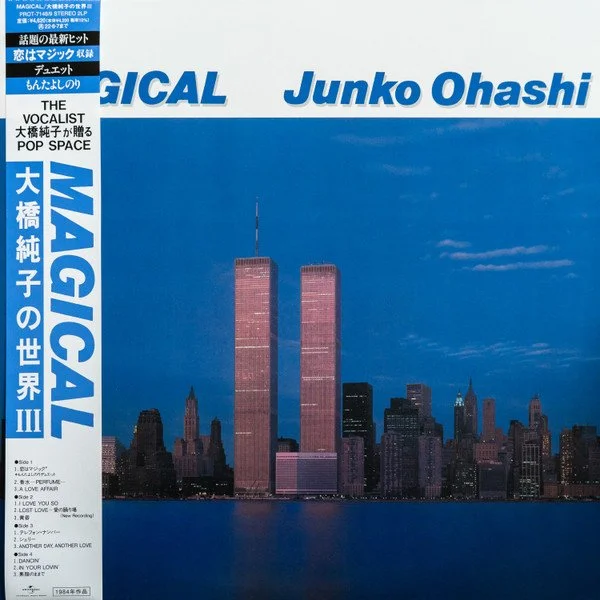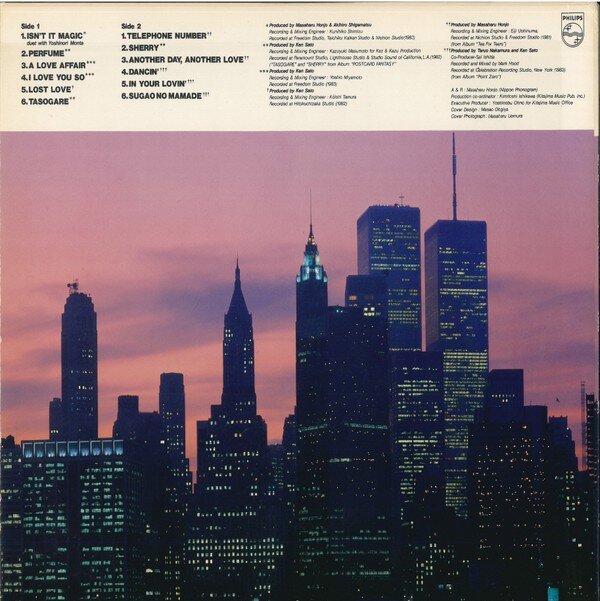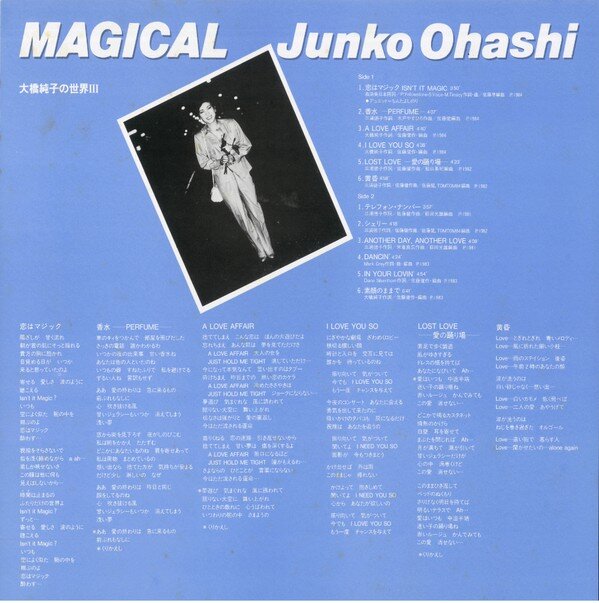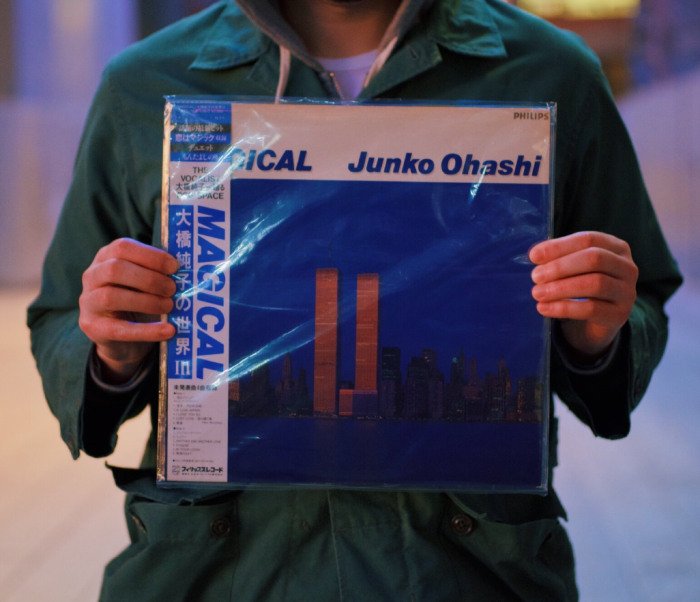Junko Ohashi & The Magical $500 Record
Junko Ohashi’s Magical $500 Record
[Before I begin I have to add that since this article had been posted, the album has been re-released in December 2021, but the price of the original is still upwards of $500]
They say things only cost what people are willing to pay and nothing embodies the spirit of that saying more than a very elusive and revered album by a 1980s Japanese singer named Junko Ohashi. We explore why this album specifically has garnered almost a holy grail status among fans of the genre and how City Pop records are becoming cult objects. Record collecting has become a staple of the City Pop scene, with collectors constantly trying to add classic vinyl to their collections as if the new Pokemon card craze. People who had no interest in vinyl before now have a newfound obsession with attaining these cult-status records, which is both a good and bad thing depending on who you ask.
Ohashi is a famed artist from Yubari in Hokkaido and has a discography that spans over 20 studio albums throughout multiple decades. Her status as a legend has been cemented in Japan and hers is a house-hold name. She grew up influenced greatly by Bossa Nova and also Janis Joplin who she wanted to embody in her own music. She joined a university band in Hokkaido that set her off on her incredible music career that would make her an iconic figure in Japanese music. She later became a DJ at a local radio station before having a part-time job at the Yamada Headquarters in Tokyo. There, she auditioned for a chance to release music and won a record deal. Her hits included some of City Pop's most celebrated tracks for their quintessential style markers that give you that burst of Western-styled new music fused with Japanese sensibilities that drive her music directly into peoples' playlists.
In 1984 she released a compilation of some of her greatest hits titled 'Magical', which featured some of her greatest works including I Love You So, Telephone Number, Sherry, & Dancin. The songs in this compilation are heavily featured in contemporary City Pop mixes, and I certainly used them in my earliest mixes also because of how amazing they are. The songs are exceptionally well-produced and feature some classic City Pop vibes that come from fusing synth boogie, funk rhythms, jazzy chord progressions, and the obligatory English chorus sections that evoke the metropolitan vibes of a reinvigorated Japan. It's easy to see why anyone would want this album in a physical medium as it practically drips nostalgia. Few albums evoke the awe-inducing obsession that Magical has attained in the relatively short amount of time of City Pop's resurgence.
All of this is fine and well, but when looking into purchasing this in vinyl format for your collection you'll come across a very interesting detail; the record has been valued at over $500 having sold once for $600 and currently sitting at $400. It's not unusual for a rare record to break the bank, but given City Pop's only recent rise in popularity, this is a very special case given that it's still very much an obscure record that only those who are fans of the genre will immediately recognize. The question begs to be asked; Why? The answer is not simple as there are so many motivating factors that go into deciding what a record is worth paying for. In short, my best guess is one of the biggest buzzwords of the 2010s: Aesthetics. People treasure things for 2 reasons, the way it makes them feel & and the way it makes others feel, and given the insane otaku nature of City Pop vinyl collecting it's not too difficult to see why this record has snowballed to its cult status amount followers of the genre.
Discogs current statistics for Junko Ohashi’s Magical LP
Discogs current statistics for OG pressing [5/26/22]
The album cover for Magical is a very lovely picture of the ill-fated Twin Towers in New York City in the 80s. Everyone knows what happened there so there's no need for me to rehash the story, but this tiny detail might be another clue as to why people treat this record as a mythical object. In addition to the beautiful photography, it's adorned by an immaculate obi strip that is juxtaposed perfectly to create a real visual treat for the eyes. It's a beautiful record, no doubt. Anyone would want it, and that could also be the reason why everyone wants it. Combine its hyper nostalgic cover art, insanely good track selection, and general rarity and you have the recipe for a $500 dollar price tag. But does that really explain it? Do people expect the price to continue to inflate? History has proven otherwise when it comes to fabled LPs.
Image credit: nycryanb via IMGUR
In the end, there's no way of knowing what really motivates someone to value a record at such a price other than the certainty that someone will pay for it. As someone who has paid $400 for a Tomoko Aran record before it's not out of the realm of possibility for anyone to buy anything if they can afford it, but this sort of investment can possibly pay off in the long run or crash like Japan's economy in the 90s. With iconic records getting re-released constantly by Japanese and non-Japanese labels, Junko Ohashi's Magical might end up losing a chunk of its value once it becomes available again to the public (someone please make this available to the public again). It's almost sure to happen, as my $400 Tomoko Aran LP got the repress treatment shortly after I purchased it and is now worth significantly less, but ultimately if it's an original pressing there will always be more respect given to it, and as long as you covet your vinyl then what is cost really compared to the magical feeling of owning a part of history. - Van
AUTHOR
Van Paugam is an Internationally-Acclaimed DJ and leading figure specializing in 70s and 80s Japanese Music, dubbed City Pop. He has organized and hosted over 100 events dedicated to the style, and actively promotes Japanese culture while on the board of the Japanese Arts Foundation of Chicago. He has been featured on CNN, NHK, and many other publications for his dedication to City Pop. Van is credited with being the first person to begin popularizing City Pop online through his mixes on YouTube in 2016, and subsequently through live events. Learn More…








![Tomoko Aran - Fuyu Kukan [2024 Reissue]](https://images.squarespace-cdn.com/content/v1/5bd7707c11f7847c45b4b9dd/1689118417870-VK5509S75OAQ8XLR9TEG/ab67616d0000b273138d0143d948a5314d1aea19.jpg)
![Kingo Hamada - Midnight Cruisin' [Reissue]](https://images.squarespace-cdn.com/content/v1/5bd7707c11f7847c45b4b9dd/70b59ba1-850e-4a6d-a827-34e221a172bf/WQJL-159.jpg)
![Mioko Yamaguchi - Tsukihime Moonlight [Reissue]](https://images.squarespace-cdn.com/content/v1/5bd7707c11f7847c45b4b9dd/1688493110328-NTAQQVZ245PY48X3I6H4/MHJL-278.jpg)
![Yurie Kokubu - Steps [Reissue]](https://images.squarespace-cdn.com/content/v1/5bd7707c11f7847c45b4b9dd/1688492253619-240QYD9A83G0GLRKQ08U/MHJL-282.jpg)
![Anri - Natsu Ban [New EP]](https://images.squarespace-cdn.com/content/v1/5bd7707c11f7847c45b4b9dd/1687905964336-9PV1QDIP2YNMEKDHS14R/Screenshot+2023-06-27+174101.png)
![Anri - COOOL [Reissue]](https://images.squarespace-cdn.com/content/v1/5bd7707c11f7847c45b4b9dd/1682575601801-C2BEL9RM2RUHJS9OBSL1/ab67616d0000b27339b329eaf36f09af3c2356f4.jpg)
![Anri - Timely!! [Reissue]](https://images.squarespace-cdn.com/content/v1/5bd7707c11f7847c45b4b9dd/1682575330424-OPVMZCJ0GUYHW6P0X5UT/R-5126669-1638115528-6607.jpg)
![Anri - Heaven Beach [Reissue]](https://images.squarespace-cdn.com/content/v1/5bd7707c11f7847c45b4b9dd/1682574623734-QWHWV5NQSM71KRKK8K6G/R-4777778-1618165602-9892.jpg)
![Anri - Bi Ki Ni [Reissue]](https://images.squarespace-cdn.com/content/v1/5bd7707c11f7847c45b4b9dd/1682575025867-NBUJHCR4R997RWTHJ71K/R-6161494-1640871595-6430.jpg)
![Miki Matsubara - Pocket Park [Reissue]](https://images.squarespace-cdn.com/content/v1/5bd7707c11f7847c45b4b9dd/1682919786676-RDDRQMQ80QIJP8SD61JS/IMG_8996.jpeg)
![Miki Matsubara - Who Are You [Reissue]](https://images.squarespace-cdn.com/content/v1/5bd7707c11f7847c45b4b9dd/1682919471387-FEXQME3R87Z0GGN8OM30/IMG_8995.jpeg)
![Taeko Ohnuki - Mignonne [Reissue]](https://images.squarespace-cdn.com/content/v1/5bd7707c11f7847c45b4b9dd/1677631540050-MB8QQ48ZP5NKH0P9F61Z/31qFb8S%2BGKL.jpg)
![Tatsuro Yamashita - Go Ahead [Reissue]](https://images.squarespace-cdn.com/content/v1/5bd7707c11f7847c45b4b9dd/1677630549318-VK4691LKREAD8ILYCDTG/BVJL-93.jpg)
![Yurie Kokubu - Relief 72 Hours [Reissue]](https://images.squarespace-cdn.com/content/v1/5bd7707c11f7847c45b4b9dd/1677629440079-6RWRK2ZWERH37N9Y30KE/%E5%9B%BD%E5%88%86%E5%8F%8B%E9%87%8C%E6%81%B5-yurie-kokubu-relief-72-hours-Cover-Art.jpg)
![Momoko Kikuchi - Tropic of Capricorn [Reissue]](https://images.squarespace-cdn.com/content/v1/5bd7707c11f7847c45b4b9dd/1674797802522-6G0J6KOSVEHW51M7EIWH/Tropic+of+Capricorn.jpg)
![Momoko Kikuchi - Ocean Side [Reissue]](https://images.squarespace-cdn.com/content/v1/5bd7707c11f7847c45b4b9dd/1674798147688-5U1MW4DHPF1JJCB97Q5Z/Ocean+Side.jpg)
![Momoko Kikuchi - Escape From Dimension [Reissue]](https://images.squarespace-cdn.com/content/v1/5bd7707c11f7847c45b4b9dd/1674797753044-X7EKMKXREYA8ZSZD1DAA/escape+from+dimension.jpg)
![Momoko Kikuchi - Adventure [Reissue]](https://images.squarespace-cdn.com/content/v1/5bd7707c11f7847c45b4b9dd/1674797693224-VN0M90A8BM9LPTYWBSB5/Adventure.jpg)
![Hitomi Tohyama - Imagination [Reissue]](https://images.squarespace-cdn.com/content/v1/5bd7707c11f7847c45b4b9dd/1674797015412-B47AFOTZHWA2CO5BUMAA/Imagination.jpg)
![Hitomi Tohyama - Sexy Robot [Reissue]](https://images.squarespace-cdn.com/content/v1/5bd7707c11f7847c45b4b9dd/1674714815791-4KT0NM9S4ED18FLQKHKC/sexy+robot.jpg)
![Tatsuro Yamashita - Greatest Hits [Reissue]](https://images.squarespace-cdn.com/content/v1/5bd7707c11f7847c45b4b9dd/1674713862344-KZQM2GX3TF0Y8XODXT1P/R-3282359-1533691121-1914.jpg)
![Tatsuro Yamashita - For You [Re-Press]](https://images.squarespace-cdn.com/content/v1/5bd7707c11f7847c45b4b9dd/1674713532165-3F6PUTT1U16F9RKFDKCQ/R-2179374-1576817857-6649.jpg)
![Tatsuro Yamashita - Ride On Time [Reissue]](https://images.squarespace-cdn.com/content/v1/5bd7707c11f7847c45b4b9dd/1674713298310-CX7AAYGDCK9VRC09V8F7/R-3282392-1341996717-7068.jpg)
![Tatsuro Yamashita - Moonglow [Reissue]](https://images.squarespace-cdn.com/content/v1/5bd7707c11f7847c45b4b9dd/1674712985847-GAAP57FYG3W34MT0KX6Z/R-2063296-1594137375-1639.jpg)
![Tatsuro Yamashita - It's A Poppin' Time [Re-Press]](https://images.squarespace-cdn.com/content/v1/5bd7707c11f7847c45b4b9dd/1674711577552-6OG8AHZTL0A0VMOFACE6/R-5223079-1601375868-4345.jpg)
![Tatsuro Yamashita - Spacy [Reissue]](https://images.squarespace-cdn.com/content/v1/5bd7707c11f7847c45b4b9dd/1674711439752-GP5PA47QCYGU14Q1F8I9/R-1006498-1322902455.jpg)
![Tatsuro Yamashita - Circus Town [Reissue]](https://images.squarespace-cdn.com/content/v1/5bd7707c11f7847c45b4b9dd/1674710622935-WAUHPKKQAQSUPFH8NC0G/BVJL-95.jpg)

They say things only cost what people are willing to pay and nothing embodies the spirit of that saying more than a very elusive and revered album by a 1980s Japanese singer named Junko Ohashi. We explore why this album specifically has garnered almost a holy grail status among fans of the genre and how City Pop records are becoming cult objects.